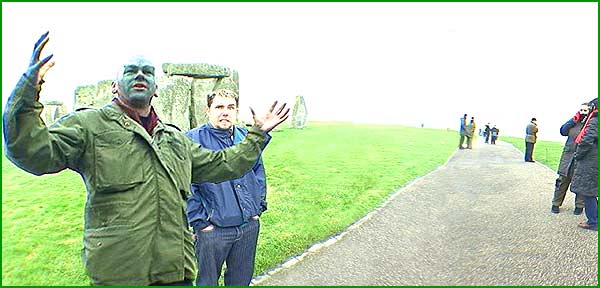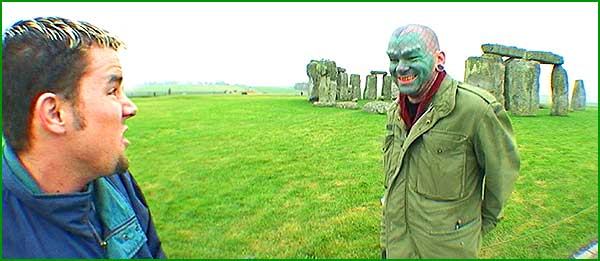 How and why the modified should go on the offensive The fight against rudeness is very serious. It is the fight for your well being and the well being of others. To be treated rudely is to be denigrated, and when done regularly it can destroy people. Being constantly put down and mistreated can have tremendous psychological effects. This is only exacerbated by having everyone else around you reinforcing the idea that you deserve the mistreatment by letting it pass as acceptable behavior. In time, the mistreated may even come to believe that they are worthless or deserving of abuse. Suicides are not the result of bolstered self-confidence and being treated with respect!“Rudeness is the weak man’s imitation of strength, and luxuriates in the absence of self-respect.” When I first thought of doing a column on rudeness, my motivation was to approach the subject from the point of view of the modified individual confronted with rude actions and reactions on the part of the individual. In the past I have attempted to address the general public on issues of how to politely approach and discuss things with those whose modifications catch their attention. But clearly, the audience I have the best chance of reaching is the modified. I am not going to use this as a forum to list or vent about the barrage of endlessly stupid questions or unconscionable actions that society overlooks when they are perpetrated against someone with visible modifications. You can get a quick idea of the sort of actions and comments, and the venom they inspire, by looking through many of the editorial experience submissions here on BME. Rather I want to discuss how and why the modified should respond with the goal of possibly enacting some positive changes.
 In identifying rudeness, especially in the case of modification, it is important to try and gauge the rude person’s motivations. Sudden exclamations may not be motivated by malice or prejudice but rather the shock and amazement of seeing something incredible and probably incredibly foreign to that person. They may very well actually be excited and find what they are seeing to be positive. When in doubt, you may wish to first discern the motivations behind the words or actions through observation or conversation to determine if it was a rudely motivated gesture or simply a misunderstanding before escalating to confrontation. In all but the most serious and obvious cases it is a good idea to give the benefit of the doubt. Think of how you would react in a similar situation – if something you were unfamiliar with suddenly walked past you, might you not forget yourself for a moment and exclaim out loud? As a person with a tattooed face I know that I still stare at other tattooed faces when I see them. To me staring is the natural reaction to something interesting. It is like a compliment – an unspoken way of saying, “Wow! Look at that – it’s cool!” If you do feel someone has been rude to you then respond. But gauge your response appropriately. If you are suddenly grabbed by someone, that is assault and reacting physically or involving the authorities is perfectly reasonable. However, if a twenty year old man grabs you at a party and you punch him, the results will be far different than if an eighty year old woman grabs you in line at the grocery store and you punch her. By the letter of the law both cases should be treated the same but that is not how society works and we need to be aware of this.
 But why Respond To Rudeness? Sometimes it just doesn’t seem worth it. Why not just let it go? It may seem that the reason to confront someone who is rude to you is as simple as the personal affront to you, the righteous indignation that they shouldn’t be allowed to get away with it. And while I would agree that this is a large part of it, it goes deeper than that. Rude behavior, like all behavior, is habitual and an expression of that person’s thoughts and opinions and mediated by what they believe is appropriate or what they can get away with. And while the shock of seeing an incredible or foreign (to them) modification may distort the boundaries for them, they are not going to act horribly inconsistent with their usual behavior. Rude people act rude because they think it is ok or that they can get away with it, and they will continue to do so until something makes them think otherwise. Every time you have the opportunity to confront rudeness you have a chance to help reform that person’s behavior. In all likelihood, it will take many confrontations to break the habit of rudeness. And, as we all are all probably familiar, it is much easier for an established habit be reinforced than broken. When you do not confront rudeness, not only do you forgo a chance at helping stop it – you actually encourage it by giving that person the positive reinforcement of getting away with it. Fighting against rudeness is fighting for survival. We cannot live and let live. That creed only works as a two way street – if you try and live and let live with someone who wants you gone, you will be crushed. Those who try to promote such a path are often just trying to set the other side up for a cataclysmic defeat. If you bury your head in the sand, someone will come along very quickly to bury the rest of you.
IAM members click here to discuss or comment on this article
View all columns by Erik Sprague | Return to BME/News |
